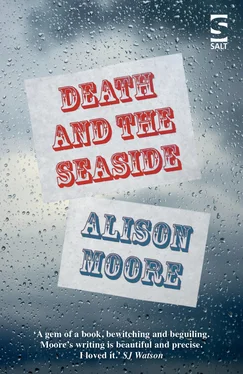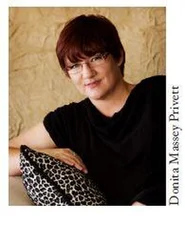‘Your teacup,’ said Sylvia, nodding at the empty cup at Bonnie’s feet, ‘would work just as well, or your hand cupped over your ear.’ Bonnie cupped both hands over her ears and tried to hear the sea. She thought that perhaps she could almost hear it; there was a distant rumble. She took her hands away from her ears and Sylvia said, ‘Where was it that you almost drowned?’
‘I jumped off the end of a pier in Blackpool,’ said Bonnie.
‘How old were you?’ asked Sylvia.
‘Nine or ten,’ said Bonnie, ‘something like that.’
‘That would have been after I last saw you and your mother,’ said Sylvia. ‘What made you do it?’
Bonnie frowned and scratched her arm with bitten fingernails. ‘I’m not sure. I don’t really remember doing it. I remember being on the pier, and I remember the railings, and I remember landing in the water, going under.’
‘And you almost drowned?’
‘Well, no, not really,’ said Bonnie. ‘I could swim. I swallowed a lot of seawater though, swimming to the shore. My dad was standing there waiting for me. “One of these days… ” he said. I don’t remember what, or even if he told me. “One of these days,” though, he said.’
‘Where was your mother?’ asked Sylvia.
‘She was still up on the pier,’ said Bonnie, ‘looking down at where I’d jumped in. She was probably wondering whether she should go in after me.’
‘But she didn’t?’
‘No,’ said Bonnie. ‘She took me for my first cup of tea. We didn’t go back onto the pier after that.’ She picked up the pack of cigarettes that was in her lap, and lit one. ‘But Blackpool has three piers,’ she added. ‘The second time might have been there as well.’
‘The second time?’ said Sylvia. ‘You’ve done it more than once?’
‘Yes,’ said Bonnie. ‘And after Blackpool, there was Bognor Regis.’ On Bognor’s stunted pier, she had seen the sea — green like cats’ eyes — between the planks beneath her feet, and the railings had been like a silver ladder. ‘And then Belgium Pier in Blankenberge.’ She remembered a semi-circular wooden ledge around the end of the pier in Blankenberge, with words carved into it, Flemish perhaps, which she could not understand. The ledge was wide enough to sit on. She could feel — against her bare skin while she sat with her legs dangling over the water — the shape of the words in the timber.
‘What if the tide had been out?’ said Sylvia. ‘Would you still have jumped? And what if you had landed on rocks?’
Bonnie shrugged. ‘After a while, we stopped going to resorts that had piers. That’s probably when we first went to Seaton, which doesn’t have a pier.’
Sylvia leafed through the pages of the story. ‘I don’t like the bit about the man with tattooed eyes,’ she said. ‘I’m not sure it’s necessary. Is this someone you’ve actually seen?’
Bonnie reached across again and took her story out of Sylvia’s hands. ‘There was a teacher at school,’ she said, ‘who had this really thick, dark hair. Then he got his head shaved for charity, and when all the hair came off, you could see the pair of eyes that had been underneath, tattooed onto his scalp. They were really creepy, but he kept his head shaved after that because when he was teaching, none of the kids ever messed around behind his back, because the eyes were always watching them.’
‘But they knew, of course, that these eyes were only tattoos?’
‘Yes,’ said Bonnie, ‘but it worked anyway. It’s like how cardboard policemen in shops deter shoplifters.’
‘Have you ever actually thought,’ said Sylvia, with a smile, ‘that there were monsters under your bed?’
‘I did used to have to get my mum to look under there,’ said Bonnie, ‘otherwise I couldn’t get to sleep.’
‘Did you know,’ said Sylvia, ‘that there are stories of psychologists or researchers gathering data by hiding under people’s beds, without their subjects’ knowledge?’
‘Surely not,’ said Bonnie. ‘That doesn’t sound like something that would be allowed.’
‘This was in the 1930s,’ said Sylvia. ‘It wouldn’t be allowed now.’
Bonnie dropped the end of her cigarette onto the ground. Out of habit, she would have ground it out with her heel, and her bare foot did twitch towards it, but she left it smouldering. She glanced at her watch. It was three o’clock. ‘It’s really too hot for tea,’ she said, leaning down and picking up the empty cups at their feet. ‘But I’m going to put the kettle on anyway.’
From the kitchen, Bonnie could hear the television that she had left on in the lounge. She often left it on the twenty-four-hour news channel, so that there was a permanent background murmur of reporting, the same stories repeating throughout the day, the same headlines flashing up on the screen. Occasionally, in amongst the tragedies, there were reports of survivors: a newborn baby found alive after five days alone down a storm drain; people rescued from rubble after nearly a week, nearly two weeks, nearly three weeks; a cat rescued from a storage container after a month of living on nothing but condensation; a man found clinging to the hull of his upturned boat after sixty-six days adrift at sea; another man who drifted across the Pacific Ocean for four hundred and thirty-eight days before being washed ashore, thousands of miles from home. Bonnie could have put all these stories into a scrapbook; she could have had a book in which everyone survived.
The kettle worked itself up to a boil and Bonnie made the tea.
Returning to Sylvia with the two full cups, Bonnie said, ‘I’m going out for a meal next week, for my thirtieth birthday. It’s not actually my birthday any more but nobody could make it on the day, so we’re going out next Saturday. Would you like to come?’
‘I would rather like that,’ said Sylvia. ‘I’d like to meet your friends.’
Bonnie passed her one of the teas. ‘Cheers,’ she said, and Sylvia said, ‘Good health,’ and they touched the rims of their cups together, although the tea was too hot yet so they did not drink the toast.
When the sun began to sink, Sylvia went back to her own flat, and Bonnie remained in the backyard watching the warm light go out of the evening, watching the sky whiten and then faintly purple, like a wash of watercolour, like Dulux Violet White. The trees turned black and looked, thought Bonnie, like something designed by Tim Burton. Her skin cooled. She felt comfortable, and it was an effort to get out of the deckchair and into her bed, and then when she was in bed she could not sleep. She put her coat on over her nightie and walked to the all-night garage, where she bought a bar of chocolate, and opened it on the way home. She did not see a soul apart from the cashier who dealt with her through the night hatch; and a strange man, tall and dark in the darkness, waiting outside her house, holding a briefcase. She almost said to him, ‘Are you looking for me?’ But before she had swallowed her chocolate, the sound of an approaching bus made her turn around. The last bus of the night drew to a squealing halt at the stop outside the house. The man got on and the bus took him away.
At the Lab, Chi was increasingly absent. She had begun to miss days and then whole weeks. ‘Where’s Chichi?’ Mr Carr would say. ‘Why isn’t Chichi here?’ Bonnie did not know why, and Mr Carr would say, ‘Fat lot of use you are.’ Bonnie was given Chi’s work to do, alongside her own, although she would not be paid for doing both. She cleaned Chi’s offices, and the canteen, on whose herringbone parquet floor she had to use the buffer, a machine that Bonnie found frightening: it seemed to have the potential waywardness of a shopping trolley, as well as a surprisingly powerful motor.
Читать дальше












